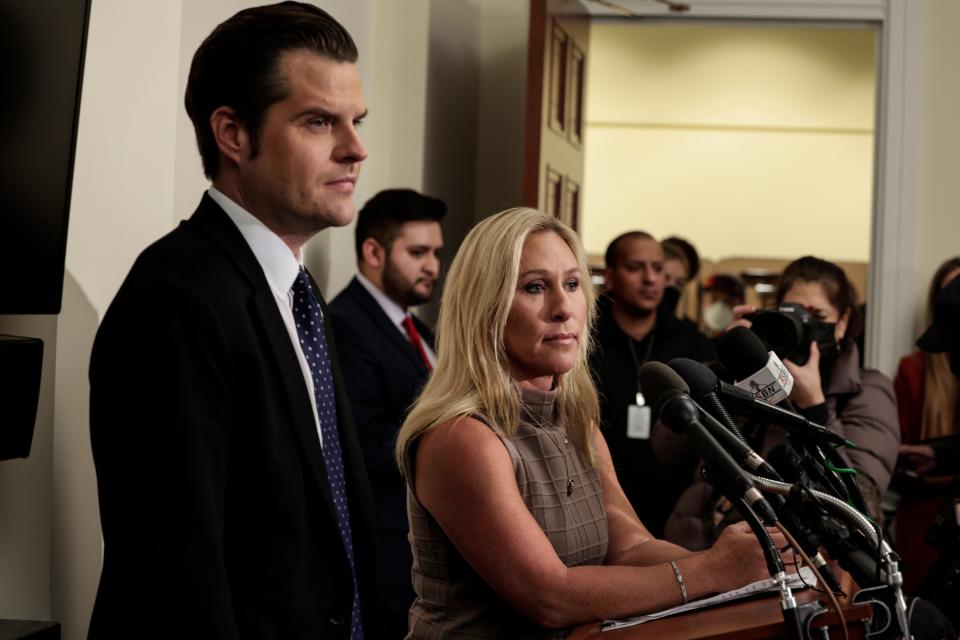Mimicking Donald Trump, far-right lawmakers use personal celebrity to draw in donors
Deborah Castleman was a life-long Democrat. But in 2016, the 68-year-old retired engineer from California decided she wanted to vote for a candidate who would leave the latest international treaty on climate change.
Castleman, who worked on former President Bill Clinton’s 1992 campaign and in his administration, said Donald Trump was her last choice for president, but she was won over by his willingness to leave the Paris Agreement. Then she heard him speak and he awakened a sense of patriotism in her, she explained to USA TODAY.
She never went back.
Now, Castleman gives to some of the most ultra-conservative members of Congress, all ardent Trump followers who have picked up his America First mantle: Marjorie Taylor Greene of Georgia, Matt Gaetz of Florida, Lauren Boebert of Colorado, Madison Cawthorn of North Carolina, and Paul Gosar of Arizona. She gave them nearly $4,000 total in 2021.
Biden and student loans: Bankruptcy very rarely erases student loans. Even when it does, the US government has put up a fight
She and six other donors who spoke to USA TODAY are among the thousands of individual contributors who are giving to the farthest-right members of Congress as they seek reelection. Inspired by their brash positions and the backlash they draw, the donors are helping these lawmakers amass campaign fortunes with little to no help from corporate political action committees, extending the right-wing populist movement Trump started.
Success in campaign fundraising is no longer the result of support from political parties or political action committees, experts told USA TODAY. Now, the nation’s media and campaign finance ecosystem encourages candidates to make outrageous statements that boost their media presence, exposing their views to potential donors and repeating the cycle, just like Trump did.

“Some of them have achieved celebrity status by their antics,” said Ray La Raja a political science professor at the University of Massachusetts at Amherst and also the author of “Campaign Finance and Political Polarization: When Purists Prevail.” “I mean, they're like Trump. They really understand how to get media attention and getting media attention is the name of the game, not governing.”
The discipline so many of these politicians have faced – like when House Democrats stopped Greene and Gosar from serving on committees – and the backlash they’ve received over intolerant comments hasn’t ended Castleman’s support. If anything, it’s been motivating.
“If they get attacked, unfairly, that’s when I usually contribute,” Castleman said, “just to show that, ‘Hey, even if you’re getting attacked, there’s people out here that support what you’re doing.’”
Trump investigation in Georgia: Remember Trump’s call to ‘find’ votes in Georgia? Meet Fani Willis, the DA who could charge him
Bringing in big dollars through individual donors
While most candidates for office get the majority of their money from individual donors, the ones who support Trump’s nationalist economic and foreign policies – dubbed America First – stand out. They’re raising significantly more than the average House candidate.
Greene, Gaetz, Boebert, Cawthorn and Gosar all raised more than double the median ($108,333) House candidates raised in 2021. Greene led the way with a whopping $7.2 million followed by Gaetz ($4.2 million), Boebert ($3.2 million), Cawthorn ($2.6 million) and Gosar ($343,000).
More: 'America First' groups try to bring nativism into the mainstream
More: Why lawmakers reap rewards from firebrand tactics
Greene, Gosar, Boebert and Cawthorn all received roughly 99% of their contributions in 2021 from individual donors, higher than the median House candidate at around 95%. Gosar, who has been in the House for more than a decade, received about 96% of his money from individual donors. The group's average proportion of support from people giving less than $200 was higher than the House's six most-progressive members: 58% versus 49%.

 Yahoo Sports
Yahoo Sports 